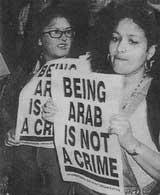
No, we don't. What a crock! Former New York City Police Commissioner Howard Safir made this unsubstantiated assertion to TV personality Chris Matthews while defending the NYPD's effort to "randomly search" subway users.
Since the London subway bombing, there has been a lot of this fear-mongering:
The Assemblyman plans to introduce legislation to repeal state anti-racial profiling laws so that police can stop people they think are terrorists.New York state Assemblyman Dov Hikind (D-Brooklyn) held up photos of Muslim men at a news conference last week and said: "The individuals involved [in terrorism] basically look like this. Why must police think twice before examining people of a particular group?" [LA Times report.]
Naturally, there are objections:
Councilmember Charles Barron, representing a largely black constituency in Brooklyn, noted that the police profile of a "typical" New York drug dealer is a 22-year-old white male. "I'm certain [legislators supporting profiling don't] want us to go to Staten Island and check out all of the 22-year-old white men there for drugs," Barron said. "We want the same kind of justice to be observed whenever police start searching people on the subway."
Most of what US authorities are doing about "security" is bullshit. In its more benign form, it is simply something baffled governments do to convince frightened citizens that they are doing something. I put stationing National Guard troops with telescopic equipment below the Golden Gate Bridge in that category: slightly foolish, expensive, but harmless. (When the same Guardsmen were patrolling San Francisco Airport after 9/11 it wasn't quite so harmless; one of them shoot himself in the butt.) But when government incites more fear of terrorism than is warranted and turns to rounding up (in Safir's words) "the enemy" who is not "us," then security theater does far more harm than good.
- it gives frustrated police departments license to "round up the usual suspects," without any showing of wrongdoing;
- it leads to culturally ignorant guesses about people's ethnic and religious affiliations and imputes guilt simply by association with stigmatized groups;
- it alientates members of suspected communities who might have some actually useful tips for law enforcement;
- and it undermines the very best instincts of people who, left to their own devices, are usually quite imaginative and resourceful in a crisis.
Baruch Fischhoff is a professor of social and decision sciences at Carnegie Mellon University and president of the Society for Risk Analysis; he has described how we actually react in a emergency:
There really are a few, somewhat organized, somewhat funded, nutcases out there who believe they have a right to terrorize the people of the US and other countries. But the answer to terror is not more fear, more racial profiling, and diminished civil liberties. The answer to terror is courage, understanding as much as we can about causes, intelligent law enforcement, and cleaving to our own best ideals including equality of all persons and the rule of law.…the critical first responders in almost any crisis are ordinary citizens whom fate has brought together…. In discussions of homeland security emergencies, one hears "panic" a lot, despite the evidence that panic won't be likely, whatever our enemies throw at us…. If our leaders are really planning for panic, in the technical sense, then they are at best wasting resources on a future that is unlikely to happen. At worst, they may be doing our enemies' work for them - while people are amazing under pressure, it cannot help to have predictions of panic drummed into them by supposed experts.
It can set up long-term foreboding, causing people to question whether they have the mettle to handle terrorists' challenges…. It's time to end chatter about "panic" and focus on ways to support public resilience in an emergency.
No comments:
Post a Comment